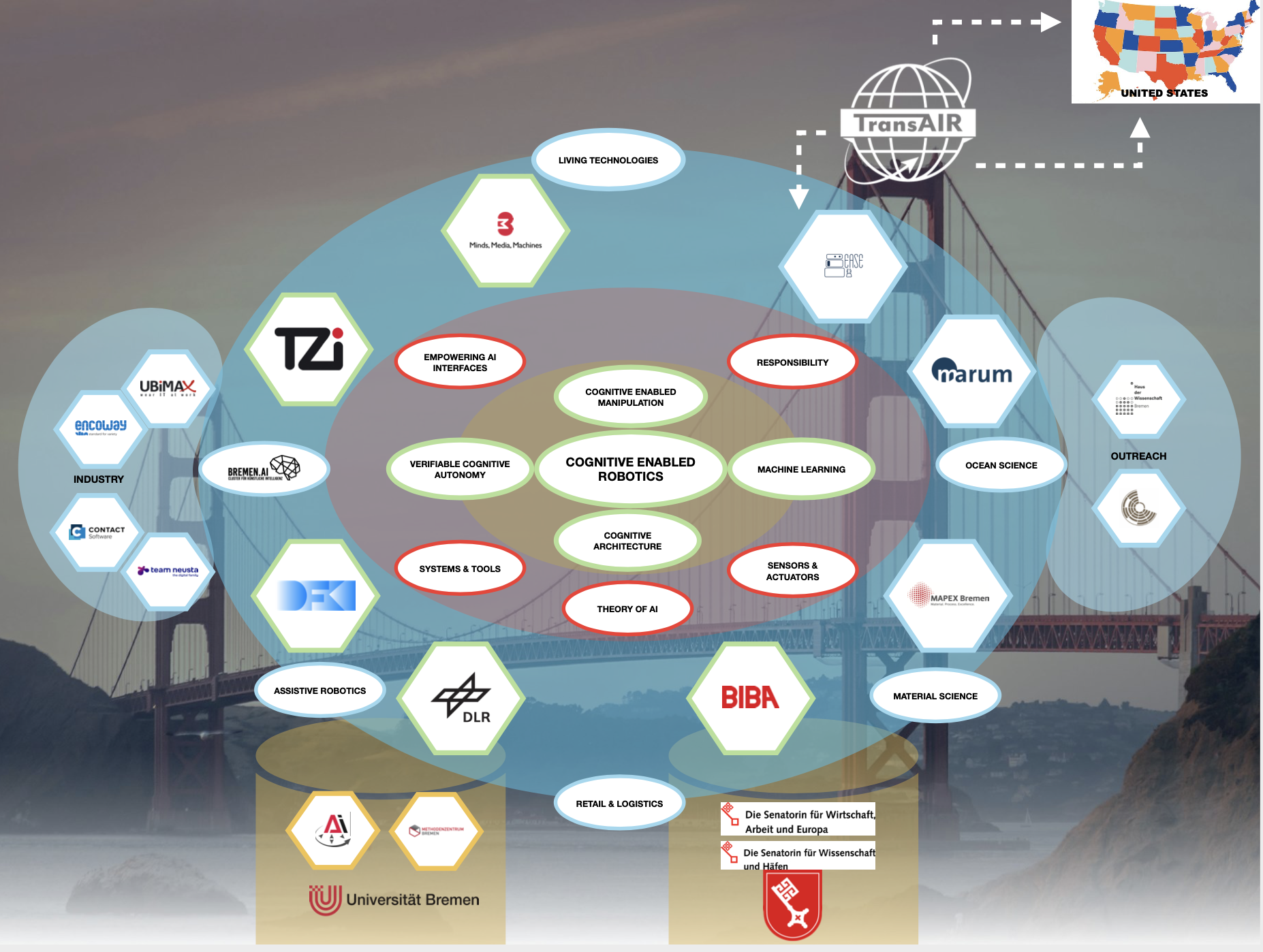



Bremen’s AI research network covers a wide range of specializations, methods and application areas. The core focus on cognitive-enabled robotics integrates all aspects that are required to create robots which are capable of performing everyday activities – this comprehensive approach can rarely be found anywhere on Earth. It includes machine learning as well as cognitive architecture, cognitive-enabled manipulation and verifiable cognitive autonomy. The approach also includes building a layer of transfer mechanisms around the research activities to spread the use of state-of-the-art AI methods and procedures as widely as possible. A third layer around the cognitive-enabled robotics core consists of institutions that promote the AI and robotics use in many different fields, e.g. healthcare, logistics, retail, production, material sciences, aerospace, and geosciences.
Bremen is one of Germany’s leading industrial hubs, but it is also home to a flourishing ecosystem of IT firms and universities. One of the area’s major strengths is its high level of expertise in the fields of robotics and AI. This provides significant potential for cooperation between researchers, software companies and regional industry, including the automobile and aerospace industries, machine building, logistics and renewable energy.
Among the city-state’s largest employers are Daimler (Mercedes), which builds electric cars in its local plant, and Airbus. More than 50 technology research institutions are based here, representing all major German research powerhouses such as Max Planck Institute, Fraunhofer, the German Research Center for Artificial Intelligence (DFKI) and the German Aerospace Center. About 37,000 students are enrolled in eight universities and colleges. The drop tower at the University of Bremen, which is used for zero-gravity experiments, is unique in Europe. You can find out more about Bremen here.
The University of Bremen is a young, mid-sized research university and one of the top 50 European universities under the age of 50. It has clustered its research in six large, interdisciplinary high-profile areas which are built on a broad range of subjects. These areas include:
Bremen offers excellent AI and robotics expertise that features unique highlights in a variety of areas. Researchers and private companies have started Bremen.AI a community focusing on strengthening the region’s AI ecosystem.
At the University of Bremen, the Institute of Artificial Intelligence, the Robotics Group and the Collaborative Research Center EASE lead the way in AI and robotics. Bremen’s other large players include DFKI’s Robotics Innovation Center, the logistics institute BIBA, Fraunhofer Mevis, Jacobs University and major IT companies such as Neusta and HMMH. They are joined by a growing list of promising start-ups.
Current research topics these institutions and companies are working on include:

EASE is an interdisciplinary research center at the University of Bremen that investigates everyday activity science and engineering. Its core purpose is to advance our understanding of how human-scale manipulation tasks can be mastered by robotic agents. To achieve this, EASE establishes the research area “Everyday Activity Science and Engineering” and creates a research community that conducts open research, open training, open data, and knowledge sharing.
![]()
Minds, Media, Machines is an interdisciplinary network of researchers working closely together to enhance our understanding of intelligence, cognition in autonomous agents and teams of agents in the context of mediatized worlds. The insights are then transferred into social, computer-based, and cyber-physical systems that contribute to the welfare of our society.

The research department for Cyber-Physical Systems of the German Research Center for Artificial Intelligence (DFKI) in Bremen is working on the technical development of intelligent networked systems with focus on safety, security and correctness of such systems, and which are used in smartphones, cars, and airplanes, among other objects.
 The Bremen Institute for Production and Logistics GmbH (BIBA) is one of the major research institutions in the state of Bremen in two research areas: “Intelligent Production and Logistics Systems” (IPS) and “Information and Communication Applications in Production” (IKAP). It conducts application-oriented research and industrial contract research – nationally and internationally focusing on production and logistics in sectors such as logistics, automotive, aviation, wind energy and testing of innovative mobile technologies.
The Bremen Institute for Production and Logistics GmbH (BIBA) is one of the major research institutions in the state of Bremen in two research areas: “Intelligent Production and Logistics Systems” (IPS) and “Information and Communication Applications in Production” (IKAP). It conducts application-oriented research and industrial contract research – nationally and internationally focusing on production and logistics in sectors such as logistics, automotive, aviation, wind energy and testing of innovative mobile technologies.
![]() MARUM is the Center for Marine Environmental Sciences of the University of Bremen. Its research focuses on the role of the ocean in the climate system, interaction between geosphere and biosphere, and dynamics of the ocean floor. Our research institute operates and develops cutting-edge underwater technologies, achieves for the seafloor sample, contributes with the data center PANGAEA, and manages laboratories.
MARUM is the Center for Marine Environmental Sciences of the University of Bremen. Its research focuses on the role of the ocean in the climate system, interaction between geosphere and biosphere, and dynamics of the ocean floor. Our research institute operates and develops cutting-edge underwater technologies, achieves for the seafloor sample, contributes with the data center PANGAEA, and manages laboratories.

The Robotics Innovation Center (RIC) is a growing field of research at the DFKI that benefits from interdisciplinary cooperation: computer scientists and design engineers meet biologists, mathematicians, computer linguists, industrial designers, electro engineers, physicists, and psychologists in order to jointly develop mobile robot systems.
 The Institute of Space Systems DLR in Bremen designs and analyses future spacecraft and space missions (launchers, orbital and exploration systems, and satellites), and assesses them with regard to their technical performance and cost. It applies state-of-the-art methods of multi-disciplinary engineering in system design and analysis – for example, a system for concurrent design.
The Institute of Space Systems DLR in Bremen designs and analyses future spacecraft and space missions (launchers, orbital and exploration systems, and satellites), and assesses them with regard to their technical performance and cost. It applies state-of-the-art methods of multi-disciplinary engineering in system design and analysis – for example, a system for concurrent design.
 Technologie-Zentrum Informatik und Informationstechnik TZI conducts research at the core of the digital revolution, which affects all areas of our lives. One major question is, “How can technology serve humans–instead of replacing them?”
Technologie-Zentrum Informatik und Informationstechnik TZI conducts research at the core of the digital revolution, which affects all areas of our lives. One major question is, “How can technology serve humans–instead of replacing them?”

The Center of Methods Bremen has many years of experience in conducting social research studies, methodology research studies and experimental research in the survey context including the assessment that artificial intelligence has in our society.
The House of Science promotes the interaction of scientific institutions with the public by offering exhibitions, lectures, talks and discussions. It is a non-profit organization designed to establish understanding and appreciation of science among the broader community.

The Hanse-Wissenschaftskolleg is a non-profit foundation strengthening and promoting excellent science and research, in particular by inviting scientists, artists and authors from all over the world to temporary stays (fellowships) and by organizing scientific events. Research combines theoretical and experimental work in areas including Brain, Earth, Energy and Society as well as Arts and Literature.

BREMEN.AI is the cluster for artificial intelligence in Bremen and nearby areas. Events and digital channels managed by the cluster help users of artificial intelligence, companies, startups and researchers to connect and discuss industry and research topics.
![]()
Team Neusta is a computer software company headquartered in Bremen, Germany and one of the top-selling Internet companies in Germany.

dm-drogerie markt is a chain of retail stores that sells cosmetics, healthcare items, household products and health food.
TransAIR cooperates with other leading experts in the field of cognitive enabled robotics, especially regarding open research, data and citizen science. Our growing international network of partners includes experts at CSAIL, OpenAI, ROS Industrial, Stanford AI Lab, Dept. of Computer Science and Engineering UC San Diego, Department of Computer Science & Engineering at University of Washington, Carnegie Mellon, Allen Institute for Artificial Intelligence, Massachusetts Institute of Technology, Bertelsmann Foundation Northamerica (BFNA), DWIH German Center for Research and Innovation, and others.
Are you based in Bremen and think should be listed here? Email us: contact@transair-bridge.org, checkout our social media pages and join our community.